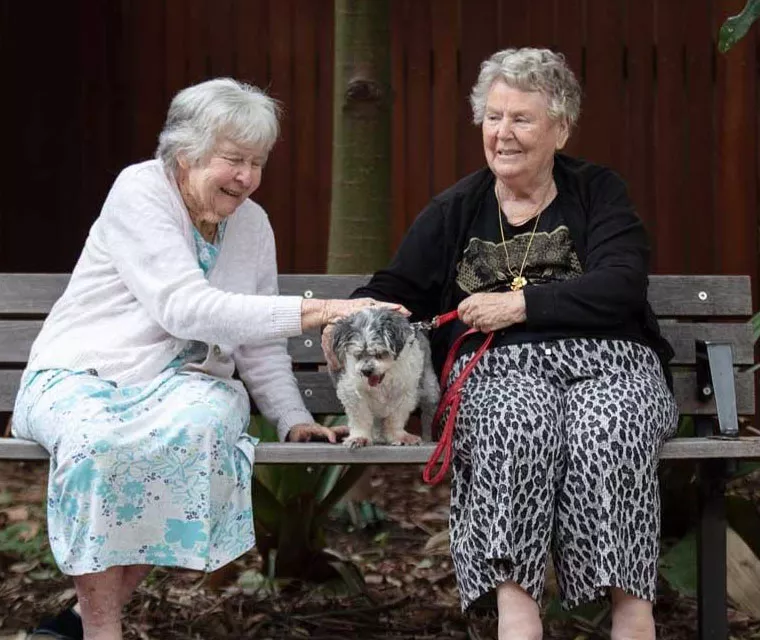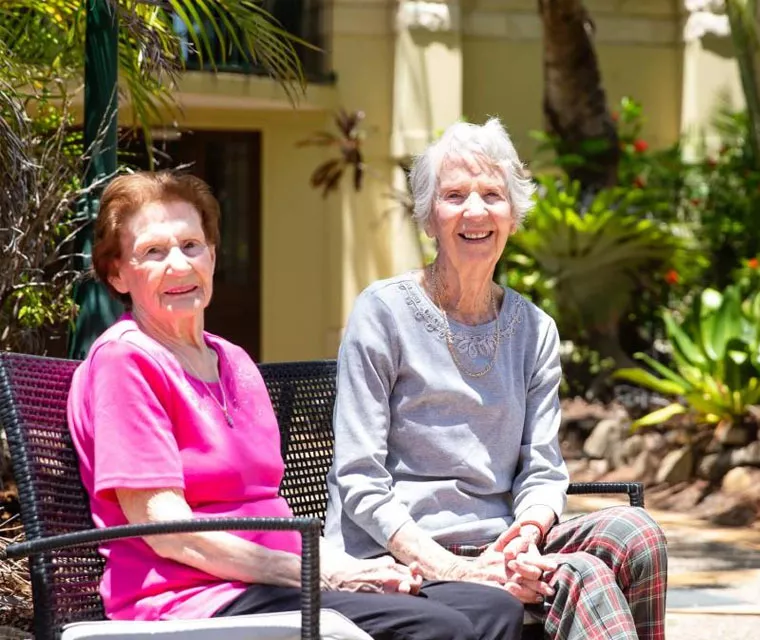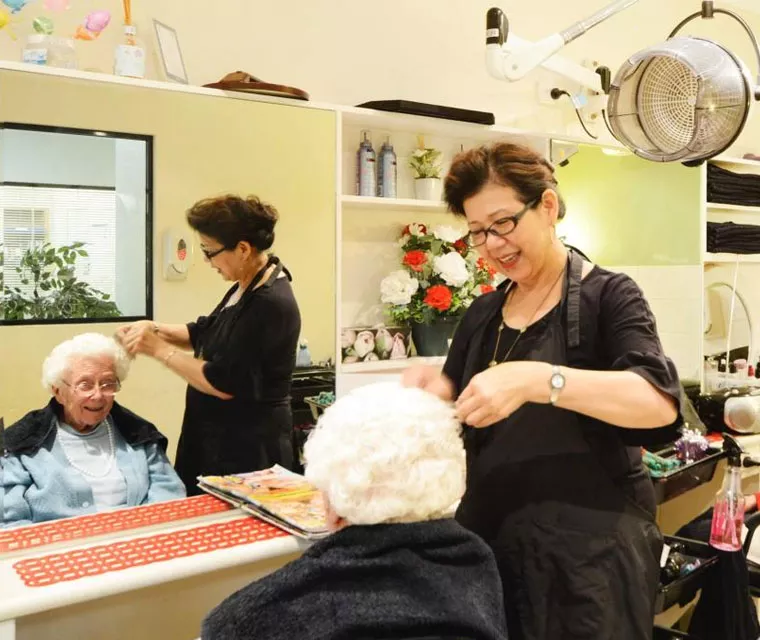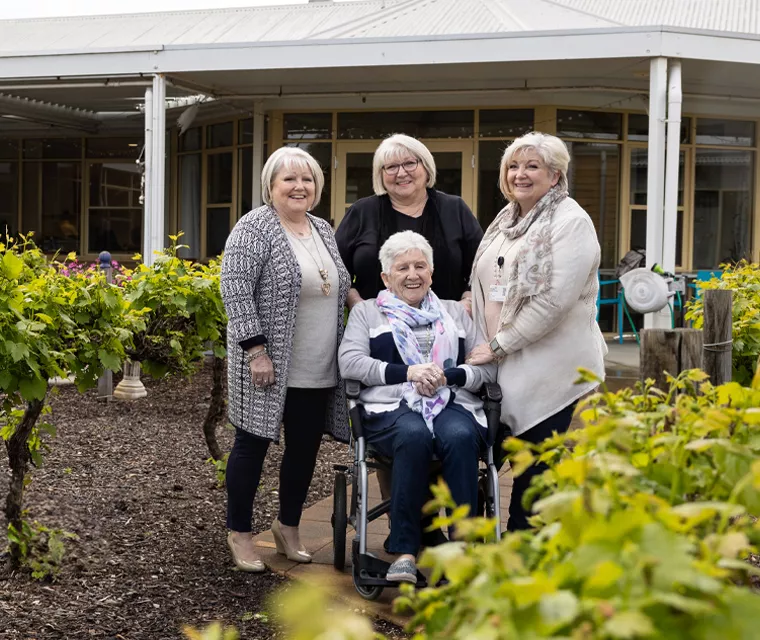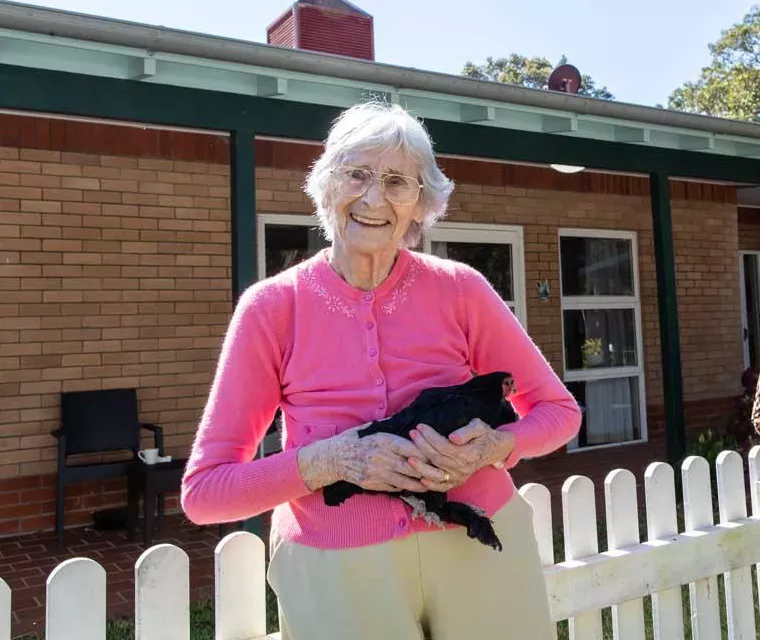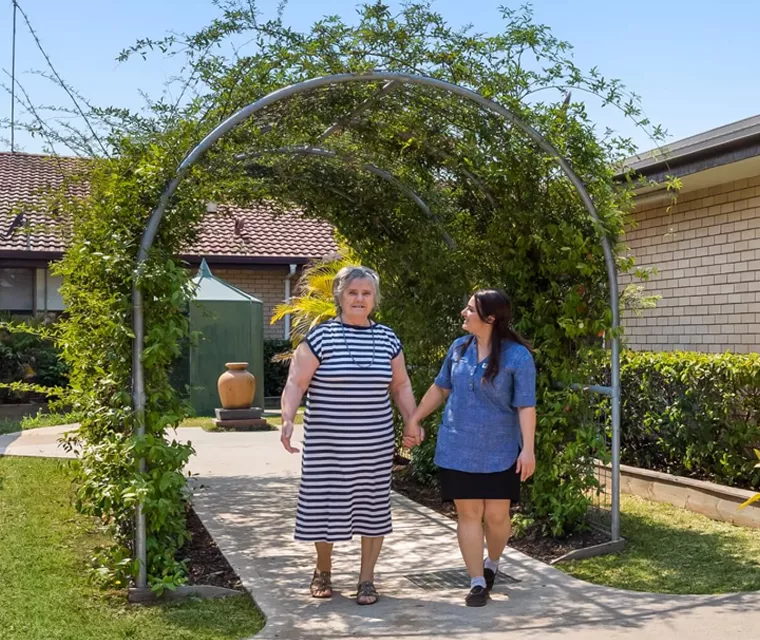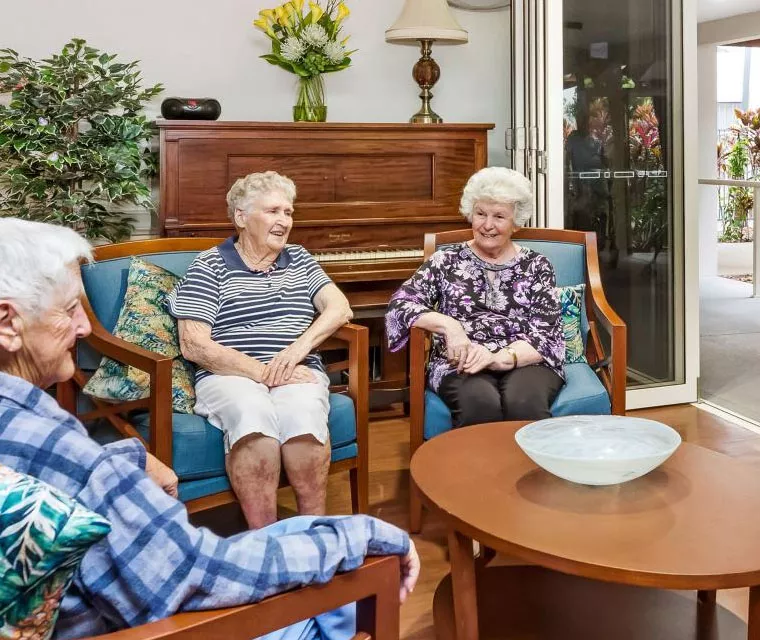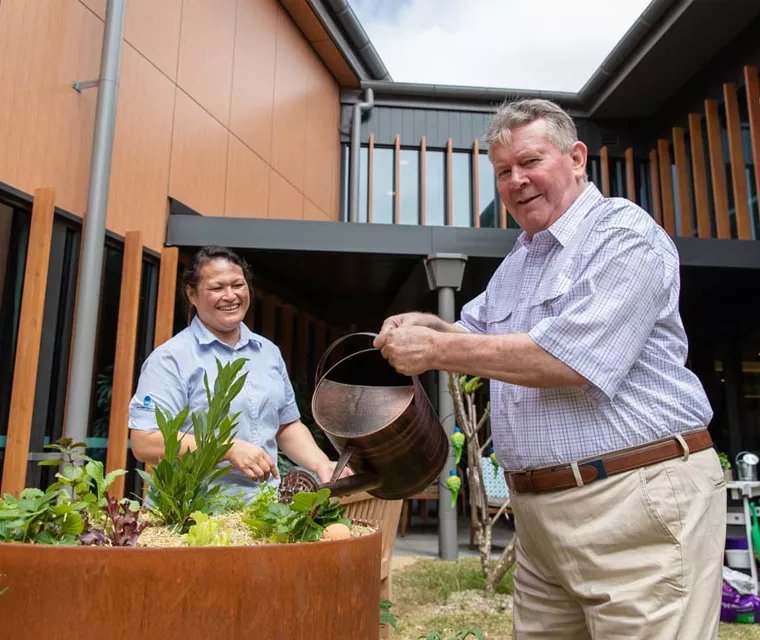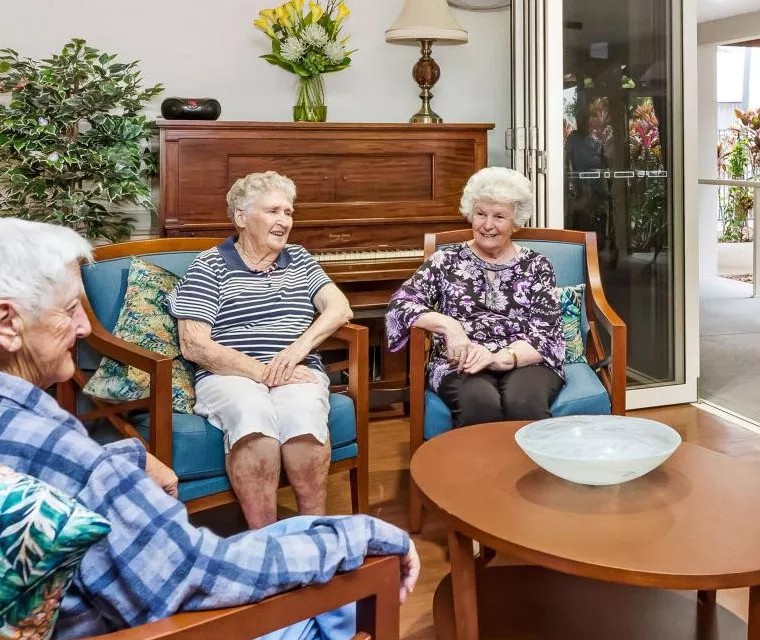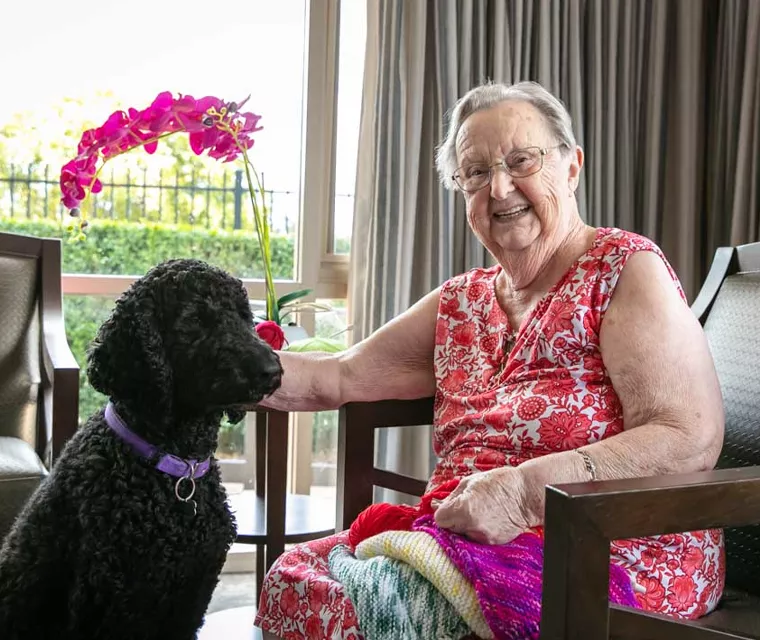
Residential
Aged care
Welcome to our Care Communities
When you move into one of our Care Communities for residential aged care, we strive to help you feel at home every day. Each one of our Care Communities is fully accredited by the Australian Aged Care Quality Commission and has a registered nurse on every shift, every day and night.
As we age, we need a safe and supportive environment where we can continue to live our best lives. At our residential aged Care Communities, we believe that ageing is not always about slowing down, but about embracing new opportunities for growth and fulfillment.
Residential Aged Care - where Ageing is Living
What is Residential Aged Care?
Residential aged care ensures our elders, who can no longer live in their own homes, can access the services they require to maintain their health and well-being. We understand that the decision to move into residential aged care is never easy, so for us, quality aged care isn't just about buildings or a lifestyle choice, it's about empathy, quality of life, and belonging. That's why at Opal Healthcare our Care Communities provide a dedicated environment to help support our resident's health, well-being, and independence.
What our Care Communities offer
Our residential aged care offers a variety of services to support older adults in their journey of ageing. Our skilled and compassionate team provides:
- 24/7 nursing care
- Assistance with daily activities
- In-house chef serving nutritious meals and nutrition support
- Access to rehabilitation services and often our own in-house Wellness Centres
- Social and recreational activities that promote engagement and well-being.
- Housekeeping and laundry services

Community and Lifestyle in Residential Aged Care
Our community is designed to be a comfortable and welcoming place to call home, with both private and shared rooms. Our common areas are perfect for socialising and spending time with loved ones and we have a range of lifestyle activities available to engage everyone. We encourage you to pursue your interests and maintain connections in the community that are important to you.
Many of our Care Communities foster relationships with local schools where residents and children enjoy engaging in regular visits, and sharing and learning from each other. Some host events for the wider community including fairs, markets, concerts, and dances. Regular bus trips are a highlight for many, taking in visits to shops, parks, beaches, and community events.
Animals play an important part in daily life and some Care Communities have resident pets such as cats, dogs, chickens or birds whilst others welcome family pets or an array of interesting furred and feathered friends for regular visits. Technology plays a part in broadening horizons and our Virtual reality goggles can help you to visit favourite places around the world or explore new ones. Tablet devices are available for entertainment and maintaining important connections.
Personalised Residential Aged Care

At our residential aged Care Communities, we believe that every individual's journey of ageing is unique. We work closely with each resident and their loved ones to understand their needs and preferences, and we develop a personalised care plan that promotes their well-being and autonomy. We offer a relaxing environment with the compassionate and personalised care of 24/7 registered nurses. Our experienced leadership works alongside a capable and confident team to offer long-term residential care, palliative care, dementia care and respite care.
Choosing the right Care Community
We understand that choosing a residential aged care community can be a difficult decision. That's why we encourage you to visit one of our Care Communities, meet our team and residents, and see for yourself our warm and welcoming environment.
Additionally, we are proud to have achieved accreditation status, which ensures that we are providing the highest quality of care to our residents.
We would be honoured to welcome you or your loved one to one of our residential aged Care Communities.
Aged Care Near Me
Commonly asked questions about Residential Aged Care
-
Once you have received your ACAT assessment, you can begin applying to as many care homes as you wish, but once you accept a place, it’s important that you let the other homes know that you no longer require their services.
-
Visiting a range of Care Communities is often one of the best ways to decide which one suits your needs. To help you assess the suitability of the Care Communities you visit, we have attached a short checklist at the end of this section. This will help you assess each Care Community and ask some important questions to the providers you meet with.
-
The Department of Human Services (DHS) is the body that determines your financial situation. To do this, DHS conducts a Combined Income and Assets Assessment, which is a form that you need to complete and submit to the government.
-
The Combined Income and Assets Assessment form (SA457) is an extensive questionnaire with over 140 questions about what you and your partner/spouse own and earn. It’s important to understand that you are considered to own half your assets with your partner/spouse regardless of who holds the title to the assets. As part of your assessment, you will be asked to provide details of all assets owned by both of you.
-
If you are moving into care for the first time after the 1st November 2025 and have not previously been approved for Home Care then these fees apply to you. For other situations, please go to our cost page here.
- Accommodation Charge (the cost of your room) - These charges are set by individual Care Communities and varies between them.
- Basic Daily Care Fee - This covers your day-to-day living costs in residential aged care, such as meals, cleaning and laundry, heating and cooling. This fee is the same for every resident in every aged care residence across Australia, regardless of your financial situation.
- Hotelling Contribution - This Means-Tested Care Fee applies to residents who are assessed to have sufficient means to contribute to their overall residential aged care costs, including nursing and personal care. If you’re required to pay a means-tested care fee, the amount will be clearly stated on the determination letter you receive from Services Australia after completing your Means Assessment.
- Non-Clinical Care Contribution - A means-tested contribution you may be asked to pay to supplement your non-clinical care costs, such as bathing, mobility assistance, and provision of lifestyle activities. The Australian Government determines the amount you pay based on your Means Assessment and may change over time if your financial situation changes.
-
Family pets are welcome to visit, although we ask our families to ensure that pets don’t enter the dining room during mealtimes. In some circumstances, you may be able to bring your pet to live with you although this needs to be agreed in advance with the General Manager. For more information, click here.
-
Dementia isn’t a single disease, but a term used to describe the symptoms of a range of illnesses which cause a progressive decline in the ability to think and perform everyday tasks. It can also lead to changes in personality and behaviour. While there is no cure for dementia, it’s important to keep in mind that it is possible to continue to maintain a good quality of life for many people. For more information, click here.
-
There are many types of dementia but the most common causes include Alzheimer’s disease, vascular dementia, frontotemporal dementia and dementia with Lewy bodies. Understanding the symptoms associated with each type of dementia can help in ensuring each person’s care needs are met.
-
Respite care is short-term care, including day respite, to provide your caregivers a break from caring when they need it. It can be planned or on an emergency basis and can be used for up to 63 days in a financial year. Many Care Communities offer day respite, which offers caregivers some flexibility to attend to personal needs and obligations as they arise.
